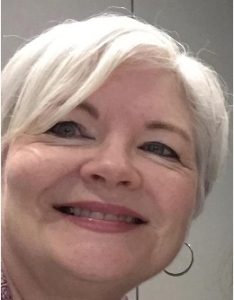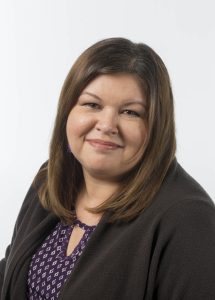
Christina Ruddy
As a proud Algonquin woman of the Algonquins of Pikwakanagan First Nation, Christina has spent the majority of her career working to empower Indigenous youth through education, language and capacity-building. She has worked in grass roots movements such as Friendship Centres, in post-secondary institutions such as Georgian College in Barrie, Ontario and with Lakehead University in partnership with the Ontario Ministry of Education. Christina is a successful alumnus of the first graduating class of the Native Community and Social Development program from Georgian College and in 2012 received the Board of Governor’s award of Excellence – Distinguished Alumni for her work with Indigenous people. Christina’s invaluable work in the promotion of Anishnaabemowin has added to efforts to preserve this endangered language both within her own community and provincially. She has worked to bring about change in Indigenous education and to make schooling more inclusive and Indigenous-focused through the Indigenous mathematics research study with Ontario teachers to incorporate Indigenous ways of teaching into the Ontario mathematics curriculum. She has collaborated with educators and administrators from the Renfrew County District School Board, and has worked as a mentor with Indigenous artists in other communities who have been part of this work. Christina has shared her experiences as an Algonquin artist researcher at a number of conferences, included four presentations at the Ontario Association of Mathematics Education annual conference. In 2018 Christina, along with Dr. Ruth Beatty, was awarded the Indigenous Partnership Research Award during Lakehead University’s Research and Innovation awards ceremony as a testament to her leadership in this project. Christina’s dedication to the celebration of Indigenous culture has resulted in many successful events and projects. Through empowering Indigenous youth to celebrate their identity, language and culture made visible in their daily lives, she embodies the tradition of passing on culture and the skills needed to preserve it to the younger generations.
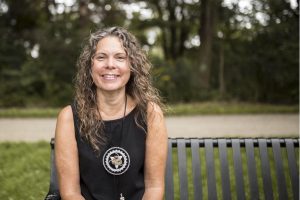
Colinda Clyne
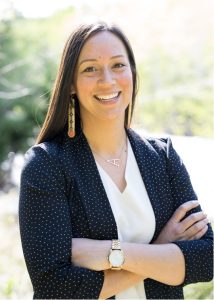
Anika Guthrie
Jody Kohoko, a First Nation Algonquin, is from the Algonquins of Pikwakanagan. She is currently the system Vice Principal of Indigenous Education with the Ottawa-Carleton District School Board. Prior to this she had 13 years of teaching experience in the Renfrew County District School Board where she was a classroom teacher, Indigenous Education Resource teacher and lead for Indigenous Education. Jody is committed to ensuring Indigenous Education, through history, perspectives and knowledge, is infused in all classrooms and in all subjects across the province.
Some of her most impactful teaching came from working with Dr. Ruth Beatty, Danielle Blair, the Algonquins of Pikwakanagan First Nation, and the staff of Eganville District Public School where they investigated, and implemented Indigenous Ways of Knowing in Mathematics.
Jody believes all students benefit from learning Indigenous knowledge and that it is through this new knowledge we will create a better Canada for generations to come.
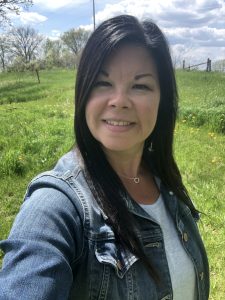
Jody Kohoko
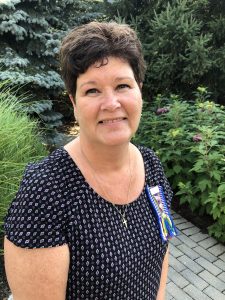
Leslie Anne Muma
Leslie’s Métis ancestry is from the west in Manitoba and Pembina ND. She was born in Halifax, NS but raised for a little time in Fort Frances, ON. It was here that her grandfather, without uttering a word about their heritage, taught Leslie and her siblings. As time goes by her grandfather’s teachings have started to make sense, as Leslie has learned more about her Métis culture and roots. Searching for her heritage and history she has discovered that her relatives include Uncle Cuthbert Grant Jr., Uncle Gabriel Dumont, and cousin Louis Riel. Leslie was raised mainly in Nunavut on Baffin Island and the Northwest Territories where she attended residential school in Fort Smith & Inuvik. Leslie enjoys going into schools all over the Grand River Council area. Grand River Council citizens are teaching Métis history, music, dance & culture to all ages. Leslie is firm in her belief of the importance that we, as a community, learn what we can of our own history and culture and share it with our youth.
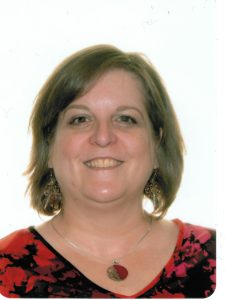
Jennifer Parkinson
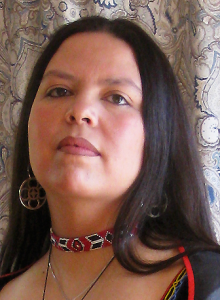
Naomi Smith
Naomi is an Indigenous Artist, Maker and Educator from Neyaashiinigmiing (Chippewas of Nawash). She has for over 20 years shared traditional teachings with various communities and groups. Her work focuses on the ways of the Indigenous people of the Great Lakes region from a historical and contemporary perspective often through the story of beads. Naomi’s artwork embraces ancestral designs using quillwork, beadwork and other indigenous methods and materials. She has exhibited her work across Canada and internationally.
Artist statement:
“Honouring our traditions is my voice within and beyond my Culture and Community. Traditionally there is no word for “art” in Native languages yet artistry and visual expression are critical in defining who we are as Indigenous people. It is this path I wish to exemplify through my teachings and my work.”
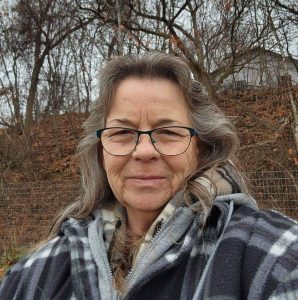
Laurie Bennett
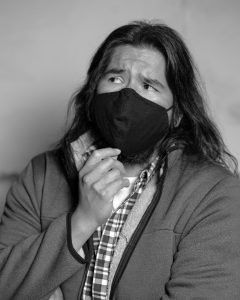
Elliott Cromarty
Elliott Cromarty is the Indigenous Heritage Program Coordinator at Fort William Historical Park. He began his journey learning about Anishinaabe culture and history as a student working at the Fort and has had the good fortune of developing skills in birch craft, drum and rattle making, snowshoe weaving, among others, over the years. Elliott works with school boards, community groups, and agencies to develop and host Indigenous education programs, special events, and workshops. He teaches the interpretive staff about Anishinaabe life during the fur trade and how to interact with visitors, encouraging them to share the culture to people from many walks of life.
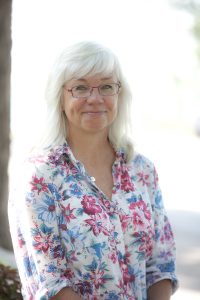
Ruth Beatty
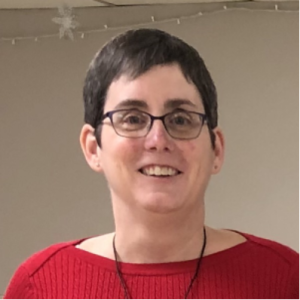
Heather Lett
Mike is a Technology Enabled Learning and Teaching-Contact(TELT-C) in the Renfrew County District School Board. A TELT-C supports the delivery of technology-integrated teaching and learning and experiential learning. Mike helps to facilitate the Traditional Ways of Knowing Mathematics project within the school board. In addition, Mike strives to incorporate technology and culturally responsive education to create inspired learning opportunities for students.
Previously, Mike was a classroom teacher at Eganville District Public School and continues to be a collaborator in the Indigenous Ways of Knowing Mathematics research project. As a classroom teacher at the Eganville public school, he has had an opportunity to build relationships with elders, artisans, and community members from the Algonquins of Pikwàkanagàn First Nation. He is grateful for the impact community members and Indigenous pedagogies have had on him personally, professionally, and in the school community.
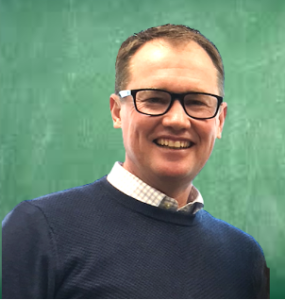
Mike Fitzmaurice
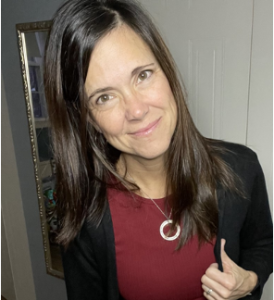
Bonnie Sears
Kris works for the Lakehead District School Board, teaching grade 5/6 at McKellar Park school. Go Thunderhawk’s! As a teacher for over 20 years Kris has welcomed all the opportunities that can help students learn in the classroom. When asked to be a part of Indigenous Ways to Know, he embraced the opportunity to bring Birch Bark Basket making into his classroom in partnership with Fort William Historical Parks Indigenous team of educators. Working with students that come from a variety of remote communities in Northern Ontario, and having the opportunity for cultural learning that they can all connect to, is a great way for students to build positive relationships with other students and staff.
When Kris is not weaving baskets, you can find him playing and learning with kids through Minecraft Education. Known as the “Minecraft Guy” Kris blends many technologies into his classroom to engage students in their learning.
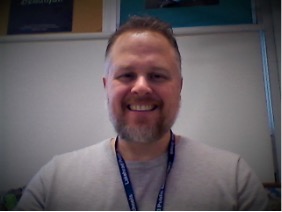
Kris Sandburg
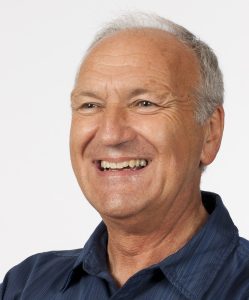
Peter Skillen
Peter Skillen, M.Ed., is Curriculum & Project Leader for CodeToLearn.ca—a federally funded Taking IT Global project that introduces computational thinking and coding to educators and students Canada-wide. Peter ‘draws’ students into ‘being mathematicians’ through the use of turtle graphics—an artistic aspect of the coding platform he has helped develop (LYNXcoding.club). He supports the Lakehead University project focusing on Indigenous ways of knowing mathematics through loom beading and finger weaving. Students code their creations in LYNX (currently available in four Indigenous languages).
Peter has been involved in technology-supported learning since the 1970s and has developed learning opportunities for both TeachOntario and the Ontario Teachers’ Federation. He was Global Ambassador for the International Society for Technology in Education (ISTE) and received two ISTE awards—including the Making IT Happen award that honours educators who demonstrate extraordinary commitment in improving digital learning opportunities for students.
Peter recently co-authored the YourVoiceIsPower.ca (YVIP) curriculum. Students learn about Indigenous issues in Canada. They use computational thinking, math, and music skills to express their message by coding a remix of Canadian Indigenous musicians’ sound clips in EarSketch. YVIP is a collaboration of Amazon Future Engineer, TakingITGlobal.org, CodeToLearn.ca, and ConnectedNorth.org.
Blog – peterskillen.org
Twitter – @peterskillen
